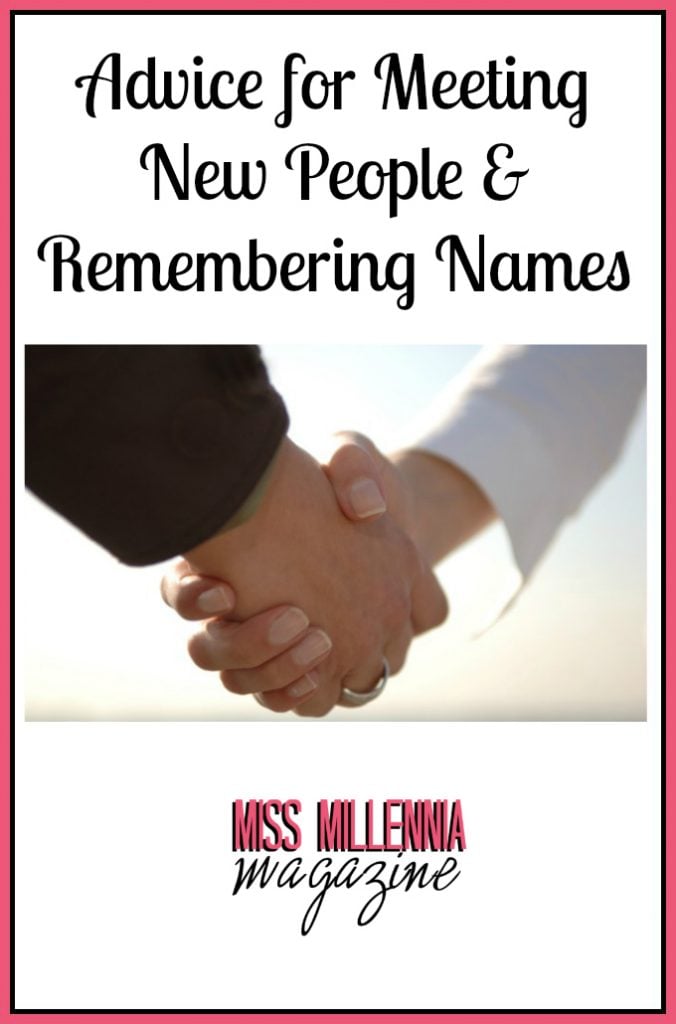Advice for Meeting New People & Remembering Names

For most of human history, meeting strangers was a rare and often dangerous thing. We’re both hardwired (and often learn and at an early age) to be nervous around unfamiliar people. But through reflection and practice we can not only become better and more confident at the things we do when we’re new, but we can re-wire our brains so that we’re not as anxious in new situations.
In prehistoric times, the average person probably knew about or met perhaps only 300-400 new people their entire lives. So being good at meeting new people wasn’t something that really gave us an evolutionary advantage, and thus we’re not wired to do it well. But we can get better at it. Here is some advice on how to improve.
A few words of advice.
- Recognize you’re hardwired to be nervous meeting new people. But the odds that something bad is going to happen is really, really small. Even if your conversation is awkward, or the other person doesn’t seem that excited to talk with you, what’s the worst that can happen? A momentary bit of embarrassment. Don’t see meeting new people as a litmus test of your self-worth but as an opportunity to learn something new about other people. And if that interaction ultimately turns into a positive relationship, it’s a bonus. If not, you had a nice conversation.
- Don’t worry about etiquette. The latest edition of Emily Post’s Etiquette has 22 pages on how to introduce other people, but almost nothing on how to introduce yourself to others. There really isn’t clear etiquette on when, where, and how to approach and introduce yourself to a stranger. So don’t worry about it. Put yourself in the other person’s position and ask yourself whether you’d be willing to be approached by a stranger in this situation. If you would, then go for it.
- Focus on giving others energy. The best way to make a good first impression is not try to make a good first impression. Don’t regale them with your accomplishments, but focus on bringing them energy by showing interest, asking them questions, and give them the opportunity to impress you. Research shows that people like others who help them feel good about themselves.
Remembering Names
Needing to remember names is a relatively new challenge for humans. Until the invention of language in the past 100,000 years, we didn’t have names, so we haven’t evolved to be really good at it. Furthermore, for most of human history we rarely had the need to learn new names, and almost never had to learn a large number of them at once.
MRI studies have shown that we actually process and store proper names like John Smith or Maria Rodriguez differently than the way we store and process other information about people. The initial connection between faces and what we learn about people AND their name is often weak. Furthermore, all the things that happen during introductions make it one of the worst times to try to hear and learn someone’s name.
A few pieces of advice:
- Make a commitment to listen carefully to their name. Researchers have found that when we discover we’ve already forgotten the name of someone we just met, it’s because we never really paid enough attention to it in the first place. Remind yourself to listen, and repeat their name right away to ensure you’ve at least gotten it into your short-term memory.
- Repeat it at the end of the conversation. Your goal should be to have the name be one of the last things you process about the person, so you can achieve #3…
- Write it down. As soon as you can after the introduction, write it down. Our ability to recognize the right name from a list is far, far better than to recall a name from our poor memories.
- Prime yourself before you meet them again. While sometimes we’re surprised to run into someone we’ve just met, often we have a good idea of who we’ll be meeting and interacting with in future situations. Reviewing their names in advance gets them back into short-term memory and dramatically increases the chance you’ll recall it when you meet them again.
Hopefully some of this advice will help you in future social situations! You’ll never eliminate all your anxiety in new situations. In fact, a little bit of nervousness keeps you focused and alert and more engaged with those around you. The key is to recognize that much of your anxiety is a product of your genes and your upbringing and not a personality defect. The social risk you’re taking in new situations is far less than your brain wants you to think. Push past it and put yourself out there—the next person you meet or opportunity you pursue might change your life.
**This post contains affiliate links, and we will be compensated for any purchase made after clicking on them. Thank you for supporting Miss Millennia!





